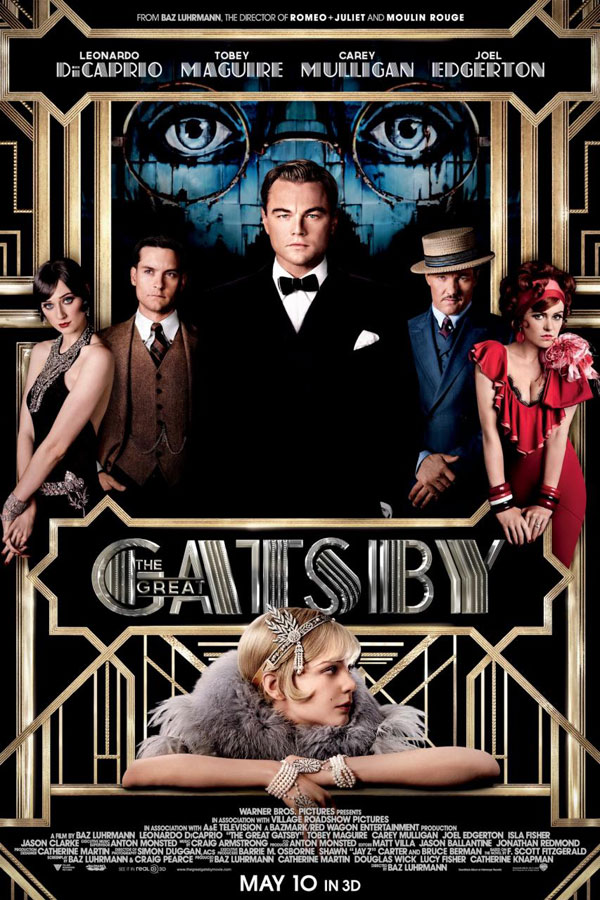Title: The Great Gatsby
Directed By: Baz Luhrmann
Starring: Leonardo DiCaprio, Tobey Maguire, Carey Mulligan, Joel Edgerton, Isla Fisher, Jason Clarke
Baz Luhrmann’s “The Great Gatsby” is brimming with stellar components – it’s just too bad they never really come together.
Like the F. Scott Fitzgerald book, “The Great Gatsby” is told from the perspective of Tobey Maguire’s Nick Carraway. He comes to New York City to work as a bonds salesman and settles down in a little cottage on Long Island right across the bay from his cousin, Daisy (Carey Mulligan), and her husband, Tom Buchanan (Joel Edgerton). Nick doesn’t fit into the ritzy West Egg lifestyle, but soon enough he’s tagging along with Tom to drink it up with his mistress Myrtle (Isla Fisher) and her friends, and attending the hottest parties in town – the ones held at his neighbor’s home, Jay Gatsby (Leonardo DiCaprio).
The film’s excellent performances, booming music selection, and mesmerizing visuals all work wonders on their own, but do little to support or enhance one another, ultimately making storytelling feel secondary to the spectacle.
The entire cast delivers, but it’s tough for anyone to overshadow DiCaprio who wholly embraces the Gatsby charm and truly convinces you that you’re in the presence of a god of sorts. DiCaprio climbs so high with the character that when Gatsby hits rougher times and his polished exterior gives way to true emotion, you’re hit with a powerful mixture of shame, compassion, and even concern for the welfare of those around him.
Gatsby’s on such an intense emotional rollercoaster and surrounded by such extreme wealth that Nick serves as the ideal anchor. He’s introduced to life in West Egg right along with the audience and then takes us with him as he navigates the parties, rumors, and drama. While Maguire does succeed in delivering an everyman who’s highly relatable and likable, he also exhibits a profound ability to show that the wheels in Nick’s head are always turning and that even though he may not be the most powerful man in the room, his presence deeply effects the trajectory of the narrative.
Edgerton is a tad one-note as Buchanan, but serves his purpose while Mulligan could have found herself in a similar position as Daisy, but pulls herself up a notch by embracing the character’s past, present and future. We know that marrying rich and being a good wife is what she was raised to do and we also know where her true emotions fall, so now all that’s left is to choose one or the other, which will totally dictate her future. Even while Daisy isn’t the one making the major moves, the fact that the events of the film will change her life is forcefully prominent.
In supporting character territory, there are three performances to note. Elizabeth Debicki doesn’t get all that much to work with, but as someone who comes across as a little more grounded and understanding than most, she serves as a source of comfort for Nick and, therefore, for the audience, too. Fisher brings on the riotous entertainment and then goes on to make a lasting impression courtesy of the chain of events. And then lastly we’ve got Jason Clarke who might have the least screen time of the lot, but delivers such a heartfelt, honest performance that out of all the iconic characters in “The Great Gatsby,” George Wilson might be one of the toughest to forget.
And still there are more characters in “The Great Gatsby” – the visuals and the music. There’s no denying that Luhrmann knows how to create a pretty picture. Nearly every single frame in “The Great Gatsby” is worthy of being strung up on the wall of an art gallery. There are a number of noticeably repetitive shots that grow tiresome, especially once you’ve passed the two hour mark, but for the most part, Luhrmann’s work takes on this mesmerizing quality that makes you want to stay within this world, and particularly the Gatsby parties. The music, on the other hand, acts as a bit of a double-edged sword. While the Jay-Z tracks do get you bobbing your head and further make you feel as though you’re really right there at Gatsby’s mansion, it’s tough to forget that it just makes no sense for a Jay-Z song to be playing at a 1920s party. The combination of modern music and the period setting is oddly both engrossing and distracting.
“The Great Gatsby” shows off first-rate filmmaking abilities in a number of respects, but those accomplishments rarely support one another and when certain components of a film only excel on their own, you just can’t achieve a fully realized, believable world.
Technical: A-
Acting: A-
Story: B+
Overall: B-

